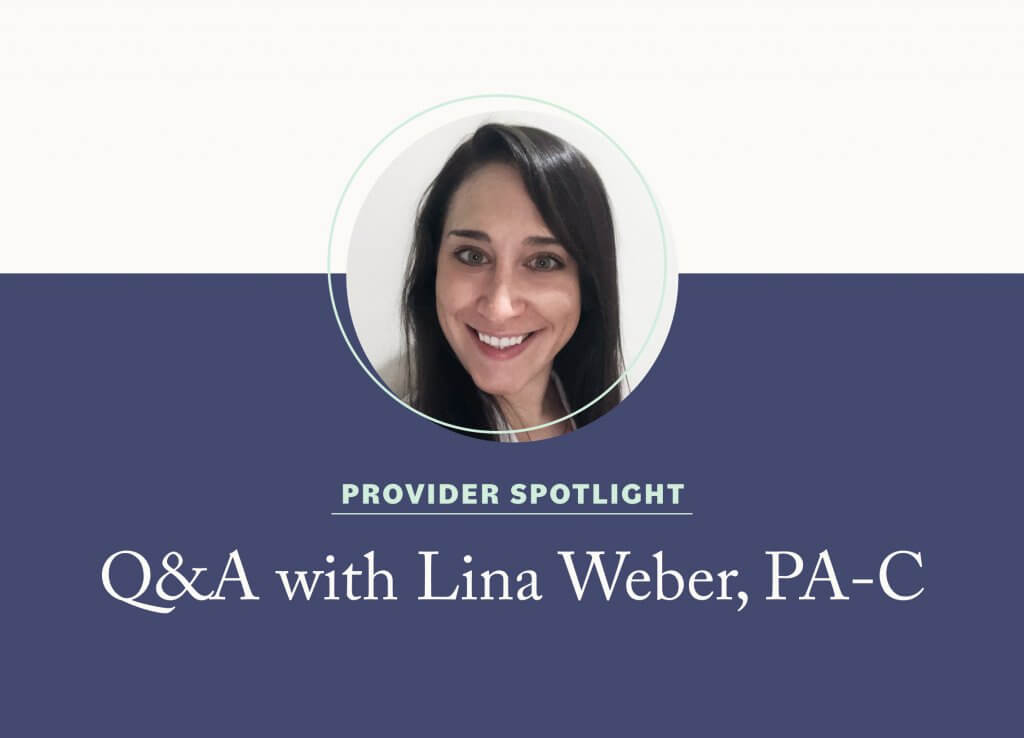At Eden Health, all members of a patient’s Care Team—medical providers, mental health specialists, and healthcare navigators—collaborate and communicate to optimize patient outcomes. In the last post of our provider blog series, we sit down with one of our clinicians to see how this care model creates healthier workforces. If you’re interested in learning more about this unique approach to healthcare, read our free e-Book, A 360 View: A Closeup Look at Integrated Care.
Tell me a little about your background before joining Eden.
My background is in neurology and kinesiology, and I worked in the neurosurgery space for a bit before I became a physician assistant. After that I worked in emergency rooms, including one in the Bronx at the start of the pandemic. While I was there, I contracted COVID-19 and was pretty sick for a couple of months, and afterwards I had residual symptoms for a really long time. So for me, understanding how COVID works has been really useful for helping my patients recover from it. A lot of them are concerned if they’re still fatigued, still have chest pains or shortness of breath. And I get to say “You know what? I had that too. And it took me a couple months, but I’m back.” That perspective helps a lot, and I’m grateful to be able to apply that firsthand knowledge to my patients at Eden.
How does Eden technology help you build relationships with patients?
Whenever I see somebody for the first time, in the app or in person, I will empanel myself to that patient, which means I’m the one to reach out to them for any sort of health maintenance. Once empaneled, I’ll create reminders to stay in touch with the patient. This is helpful for things like vaccines, some of which require two or three shots over very specific time intervals. So when I get an alert, I’ll contact the patient: “Hey, it’s nice to talk to you. You need to come back and get your second vaccine.” By reaching out consistently to all my empaneled patients, I get to know them better.
You collaborate with doctors and clinicians all the time. How does this help patients?
I’ll give you an example of a patient I had from England. He’s been in America for a couple of years and he has this very rare autoimmune disease. As general screening for this disorder, you need to have routine imaging of certain organs, but imaging can bring its own risks. So I reached out to the entire clinical team to say: “This gentleman has questions about his imaging, and I need to talk to a geneticist to determine risk. Does anybody have any history of working with geneticists in the city?”
I heard back from Eden’s Dr. Anish Mehta, who had previously done a deep dive to find providers that are familiar with this disease. He was able to link back with me and give me that geneticist referral. Two days after contacting that provider, they reached out to our patient and he is now doing great. With a whole Care Team dedicated to the patient, I had the support I needed to facilitate better and faster health outcomes.
Under Eden’s Integrated 360 spectrum of care, you also evaluate patients’ mental health. How does that work?
Let’s say a patient reaches out and they are feeling depressed. First I make sure that they’re not in crisis. I will either hop on a video visit or a phone call with them so I can actually hear them and make sure that there’s no pressured speech and that they sound stable. I’ll do a video visit to complete a mental health inventory and send it to the behavioral health team.
That team will connect the patient with one of our own therapists or set up a referral to a therapist near them. We will compile a list of providers that are in-network and near the patient’s home. I’ll let the patient know, “I have forwarded your information to my team. You don’t have to do anything. You just hang tight—in the next two to three days, we will reach out to you on the app.” A healthcare navigator will contact them with options, and then a couple days later, I’ll follow up with the patient to make sure that everything is going seamlessly.
I especially like when people take advantage of the behavioral health aspect. Because once that happens, the therapist and I become a team. Therapists don’t reveal any confidential session information, but we are connected, and of course the patient knows I’m talking to their therapist. This makes for the best outcomes for both body and mind.
What’s the role of Eden’s healthcare navigators?
In terms of insurance claims and referrals, patients can rely on our healthcare navigators for pretty much anything. Insurance plans are complicated. And to know your deductible, to understand your out of pocket expenses, to know everything about your insurance plan, to know whether a provider is in-network—that’s stuff that is difficult to understand and requires a lot of time and patience to figure out.
So instead of the patient going to their insurance website, calling a bunch of providers, making sure that all of the stars are aligned and that they can see this provider for a reasonable fee: we do all of that. My healthcare navigators will call up to 15 or 20 providers per patient to make sure that all of their criteria are met, essentially eliminating all of the research on the part of the patient. They do all of it and just present patients with a curated package of options. If the patient needs help with billing or claims or deductibles, they deal with all that as well.
What do you think Eden means by providing “concierge healthcare”?
To me, it means healthcare that is very technologically advanced, streamlined, and easy. Patients generally get what they want as long as it’s medically reasonable. In other healthcare settings that I’ve been in, patients don’t get quick response times like this. They don’t get prescription refills as quickly; everything takes a long time. But Eden has really streamlined the entire process from start to finish.
In the years I’ve spent working in emergency rooms, I’ve seen people use the ER as urgent care or even just a place for advice. They’d take an ambulance to the ER just because they have back pain—seriously. People misuse emergency rooms just because it’s really hard to see a primary care doctor or they have to wait months to see specialists. Of course, those ER trips can get very expensive and can wind up raising their employer’s health insurance costs.
With Eden, people have 24/7 access to a healthcare provider. They can use us for urgent care consultations, and we will help refer patients anywhere they need. They love that the chat and the video visits are included in their membership, and that they can get refills. They can even come to us for preventative care — we’re here to provide support across the full spectrum. I think that’s huge.
What do you like most about delivering care through Eden?
I love when I have a patient that I can see in the office, chat with on the app, deliver results on the app, and follow up with over time. I get to see them through video, through messaging, and in person. I think multiple points of contact make for the best combination of care.
Interested in learning more about integrated 360 care firsthand from our providers? Check out our interview with our Behavioral Health Specialist, Anna Kuzmenko or with our Physician Assistant, Alyson Vogel.





